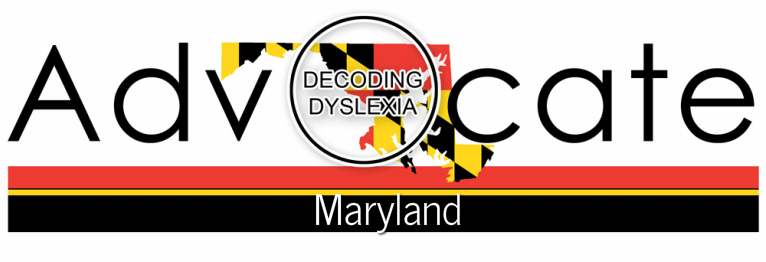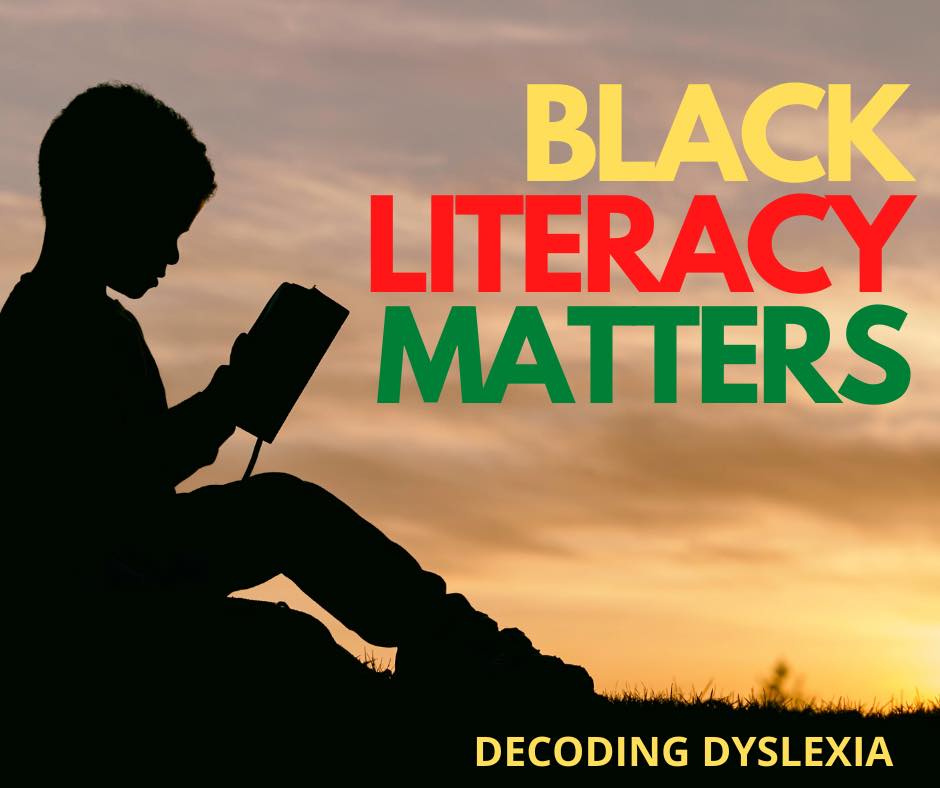|
VISION
DDMD’s vision is to ensure effective reading instruction and interventions for all students, including those with dyslexia, in Maryland Public Schools. All Maryland public school students, regardless of disability status, income, English language status, ethnicity, or neighborhood, must be provided the opportunity to learn to read, write and spell in Maryland public schools. |
MISSION
|
Policy Goals, 2021-2022
- Reading Instruction. We support local school systems that provide students with equitable reading instruction & interventions that a) meet state and federal requirements, b) are explicit and systematic, and c) include phonemic awareness, phonic decoding, vocabulary/knowledge building, language structure, reading fluency and comprehension (Section 2221, ESSA, 2015, IDEA and MD College and Career Readiness Standards).
- Prevention Framework for Reading. DDMD supports a Response to Screening, Instruction & Intervention Model and a Multi-tiered System of Support framework for reading (MTSS-r) that includes reading screening, informal diagnostics, progress monitoring, explicit and systematic core instruction, effective intensification of core instruction to address both decoding and language comprehension along with intensive, evidence-based structured literacy interventions for students with reading disabilities like dyslexia.
- Students at Risk for Dyslexia & Students with Dyslexia. We support interventions and access to structured literacy instruction and interventions for students with dyslexia or reading disabilities (Structured Literacy defined, MD Dyslexia Technical Assistance Bulletin). Students with dyslexia should be provided structured literacy interventions that are specific to the individual child’s needs, consistent with curriculum and instruction, and are explicit, systematic and based on scientific research.
- Educator Preparation, Pre-Service. We support Maryland Institutes of Higher Education (IHE) that provide teacher candidates with the knowledge and practice to teach all students to read. Whereas poverty, English language status, disability status and race are often used as predictors of reading failure, pre-service teachers should be trained to intensify instruction and interventions and provide accommodations for students at-risk for poor reading outcomes based on a strong Response-to-Screening & Intervention model.
- A recent NCTQ study found that teacher preparation programs often omit the critical foundational reading skills of phonological awareness and phonic decoding when preparing pre-service educators to teach reading.
- Programs should emphasize explicit, systematic approaches for foundational reading in conjunction with knowledge and vocabulary building and the science supporting these approaches. Teachers require a fundamental understanding of the psychology of development and learning prior to entering the classroom.
- We support oversight and accountability of educator preparation programs to ensure course content is aligned to reading science and Maryland’s College and Career Readiness Standards.
- Educator Preparation, In-Service. We support professional learning in the science of reading for educators who work with striving readers and students with disabilities like dyslexia and encourage certification by the International Dyslexia Association. Professional development for educators and programs/materials for striving readers should align with the Knowledge and Practice Standards for Teachers of Reading, IDA 2018 and the IES Practice Guide for Foundational Skills to Support Reading in Grades K-3. Professional development programs should provide teachers with the core knowledge of learning and development which have been lacking in the pre-service programs.
- Accommodations. We support access to accommodations for students with dyslexia. It is imperative that students with 504s and IEPs are provided appropriate assistive technology and accommodations so they can access grade level content in the classroom, and so tests measure their skills rather than the effects of dyslexia.
- Family Engagement in Reading and Literacy. We support public education and public-school educators. We acknowledge that the relationship among schools, districts and parent advocates is often fractious and at times adversarial. When parents and caregivers are engaged by schools as partners -- students, schools and communities benefit.
2020 Legislative Session Priorities Results
- Reading and Dyslexia Handbook Legislation: SB 575 and HB 718 are sponsored by Senator Hester & Delegate Luedtke, respectively DDMD supports the 2017 recommendation by the Maryland Dyslexia Task Force to create a Dyslexia Handbook to support parents, students and local school systems. DID NOT PASS SENATE EHEA committee due to COVID adjournment.
- Implementation of the Ready to Read Act of 2019. DDMD supports implementation of the Ready to Read Act to screen all students in Kindergarten for risks of reading difficulties including dyslexia. DDMD requests to be part of the stakeholder group that MSDE must consult with “on or before June 2020” to develop and update resources for use by local school systems and to be accessible to all. (Source: Ready to Read Act, 2019) Workgroup established after letter writing campaign to MSDE/Dr. Salmon to ensure the state followed the law.
- Blueprint for Maryland’s Future, Funding & Accountability, SB1000 and HB1300. DDMD supports the Kirwan Commission’s recommendations including the accountability and oversight measures to ensure instruction improves student outcomes for reading. Curriculum, instruction, professional learning, and assessments that are aligned to the science of reading will help close academic gaps for all students. See our coalition partner’s website for information on the science of reading: The Reading League, Advancing Evidence in Practice The Blueprint for Maryland included several amendments submitted by DDMD -- the bill passed the legislature but was vetoed by Governor Hogan. The veto was overridden in 2021.
Decoding Dyslexia’s Official Position on Black Literacy Matters (BLM)
Literacy is a human right and dyslexia is often a reason why many children and adults struggle to read and spell. Dyslexia has largely remained misunderstood and under identified in the public-school setting. Legislation, awareness, and advocacy are occurring nationally on this important topic to help increase dyslexia awareness. Our PledgeDecoding Dyslexia disavows racism, hatred, discrimination, police brutality, systematic, institutional and implicit biases.
Decoding Dyslexia pledges to diligently work to learn, listen and become aware of the effects of racism, biases, disparities in resources and programs and its impacts on Black and brown students who are dyslexic. We pledge to become conscious and intentional of our messaging, campaigns, imagery, advocacy, support and partnerships to ensure that Black and brown students and families are represented. We pledge to genuinely support, raise awareness and hold accountable the systems that overlook their needs and advocate on behalf of Black and brown students who not only have to overcome the effects of dyslexia but racism, educator bias, educational and systemic bias, access to services and information. We stand in accountability of the growth and changes we need to take, and we understand and stand in solidarity that Black lives matter, too. |
Call to Action
RespectfullyDecoding Dyslexia Alaska Decoding Dyslexia Arkansas Decoding Dyslexia Colorado Decoding Dyslexia Delaware Decoding Dyslexia Florida Decoding Dyslexia Georgia Decoding Dyslexia Iowa Decoding Dyslexia Kentucky Decoding Dyslexia Louisiana Decoding Dyslexia Maryland Decoding Dyslexia Massachusetts Decoding Dyslexia Military Decoding Dyslexia Minnesota Decoding Dyslexia Missouri Decoding Dyslexia Nebraska Decoding Dyslexia New Hampshire Decoding Dyslexia New York Decoding Dyslexia North Dakota Decoding Dyslexia Ohio Decoding Dyslexia Oklahoma Decoding Dyslexia Ontario, Canada Decoding Dyslexia Oregon Decoding Dyslexia Rhode Island Decoding Dyslexia South Carolina Decoding Dyslexia Texas Decoding Dyslexia Utah Decoding Dyslexia Vermont Decoding Dyslexia Virginia Decoding Dyslexia Washington Decoding Dyslexia Washington, DC Decoding Dyslexia West Virginia Decoding Dyslexia Wyoming
Families/Advocates of Dyslexic Children in NJ Edward and Delaney Bray The Brittain Family Mark Brugger The Evoy Family Andrew Kavulich The Lewer/Lynam Family The Marsh Family WY Lit (Wyoming) Diversity Committee Team:
|
|
Accomplishments
READY TO READ ACT Kindergarten screening for all students beginning in the 2020-2021 school year. Screening assessments must be valid, reliable and able to predict whether a student will have difficulty acquiring reading skills so help can be provided before the student falls behind. EDUCATOR READING CERTIFICATION REQUIRED On July 19th, 2019, Maryland will require a separate reading test for initial certification of Early Childhood, Elementary Education, ESOL, and Special Education Teachers (birth-grade 3, grades 1-8, and grades 6-12). Decoding Dyslexia Maryland and coalition partners Right to Read Maryland, advocated for the foundational reading assessment in Annapolis. It was one of the 7 recommendations of the Dyslexia Task Force and was shepherded through the legislative and regulatory process by Barbara Donick with Right to Read Maryland. The groups' tireless efforts to institute a reading certification for teachers who work with young children ended with the certification exam passing the State BOE unanimously. About Teaching Reading: Elementary Education, 5205 (ETS) The Praxis Teaching Reading: Elementary Education test focuses on the knowledge and skills a teacher must have to support reading development at the elementary level. It reflects the five essential components of effective reading instruction as identified by the National Reading Panel and included in ESSA, Sec. 2221, U.S.C. 20: phonemic awareness, phonics, fluency, vocabulary, and comprehension, along with other foundational reading skills students must develop, such as word recognition and the application of print concepts. In addition, the test assesses the individual’s knowledge of how to support developing literacy as an integrated skill, starting with oral language development and building to include developing writing skills in parallel with reading development. Test questions call on the individual’s knowledge of research-based reading practices as well as the ability to apply knowledge and principles to instructional situations. The test taker will be required to analyze and respond to situations involving both classes and individual students at the grade levels from kindergarten through grade six, including students with diverse needs. The Maryland State Board of Education voted unanimously to support this requirement on December 4, 2018. The requirement will take effect on July 19, 2019. Expected Outcomes: Requiring reading certification should have a domino effect on teacher preparation institutions. The coursework and certification assessment should also align with the revised Reading Course Work Standards developed by a working group of educators and higher education representatives. Students in classrooms with new teachers or teachers new to Maryland will have the benefit of an educator with the knowledge and practice to teach phonemic awareness and phonics skills to all students. New teachers will also have the benefit of a one year practicum and supervised mentoring/coaches to help ease their transition. |
DEFINE DYSLEXIA
In Maryland, there is not a statutory definition of dyslexia; however, the Technical Assistance Bulletin on SLD: Focus on Dyslexia, Dysgraphia and Dyscalculia, 2016/MSDE defines dyslexia, dysgraphia and dyscalculia and provides indicators of struggle for each along with evidence based interventions and accommodations.
MOIEP Drop Down Menu
Dyslexia TAB
|

